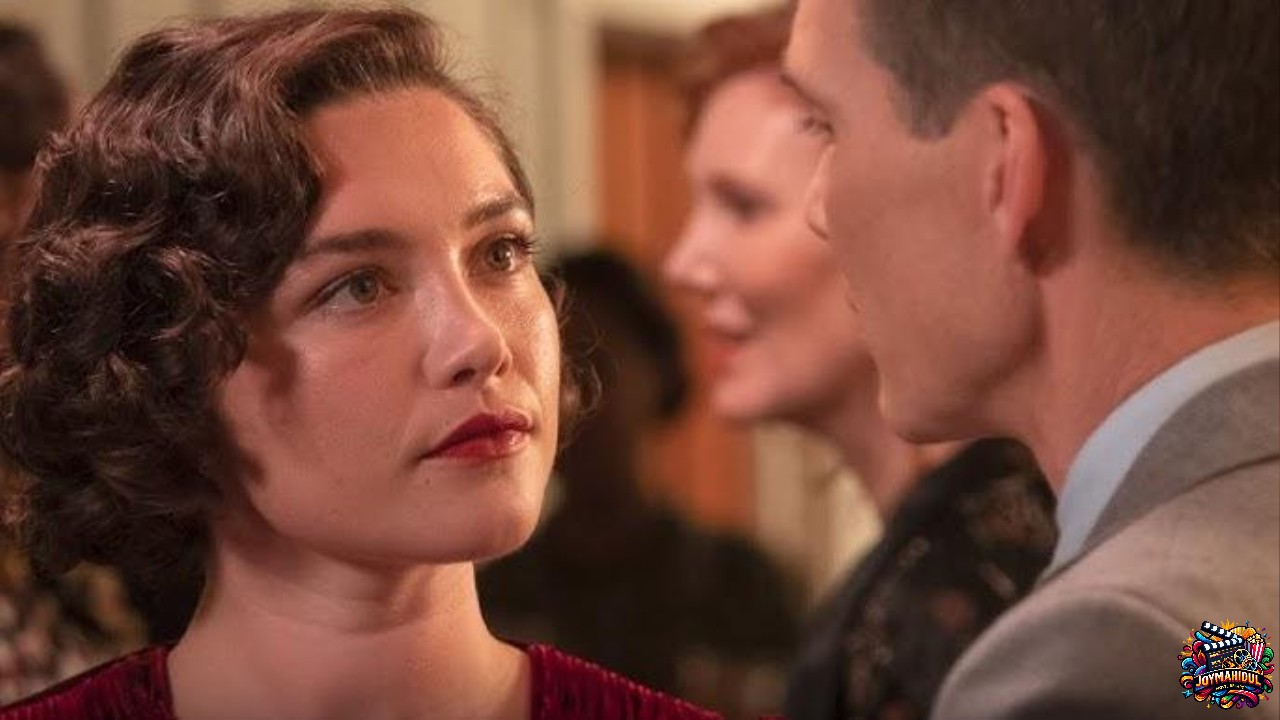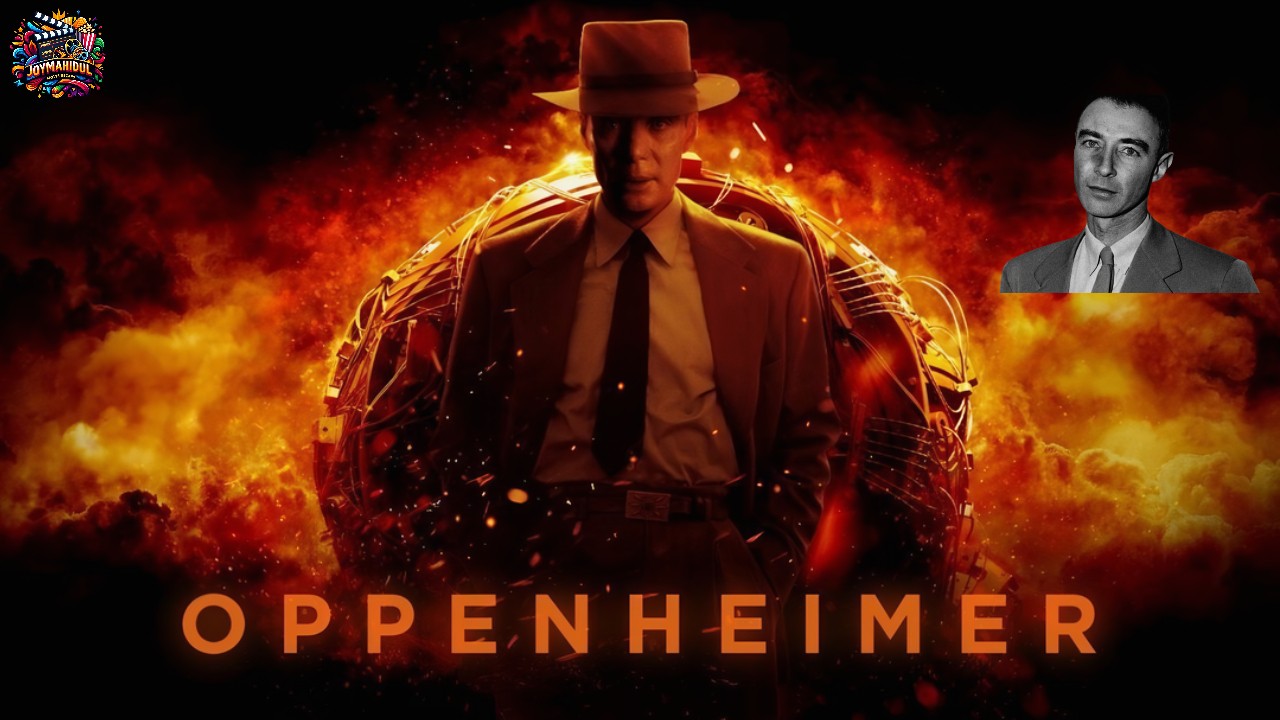Oppenheimer Movie Review: A Grand Narrative of Vision and Morality
Why Oppenheimer Is 2023’s Most Groundbreaking Biopic, Exploring the Atomic Era Through J. Robert Oppenheimer’s Story
Connecting Epic Storytelling with The Godfather, From Visionary Dreams to Nuclear Nightmares: Oppenheimer Redefines Epic Cinema!
Introduction
Christopher Nolan’s Oppenheimer (2023) is not just a film. It deeply explores ambition. It examines right and wrong. Additionally, it addresses the fallout from scientific breakthroughs. This biographical drama tells the story of J. Robert Oppenheimer, a man who changed warfare and became a very controversial figure in history. Nolan uses a unique storytelling method in Oppenheimer. The film goes beyond typical biopics. It mixes strong emotions and real history. This captivating narrative keeps viewers interested from beginning to end.
Set during World War II and the Manhattan Project, Oppenheimer shows an important time in history. But it goes further; the movie explores the personal struggles, job rivalries, and moral challenges of its main character. The worldwide effects of the atomic bomb mixed with Oppenheimer’s inner battles form a compelling storyline. This storyline creates a powerful viewing experience. It connects deeply with audiences.
Oppenheimer is a lot like Francis Ford Coppola’s The Godfather (1972) in some ways. One movie shows a crime family gaining power, while the other talks about making a weapon that changes humanity. Both films look at the price of power, the burden of leadership, and the tough choices people make.
If you like movies that think outside the box, Oppenheimer will stick with you. It’s more than just a movie; it sparks discussions about the human mind and the choices that shape history. Let’s break down this great film, looking at its cast, characters, themes, and links to The Godfather.
Character Dynamics
One strong point of Oppenheimer is its great cast, led by Cillian Murphy as the main character. Murphy’s change into the complex, guilt-filled scientist feels very real.
- Cillian Murphy as J. Robert Oppenheimer: A dreamer stuck because of what he made. His struggle and loneliness are like Michael Corleone’s story in The Godfather.
- Emily Blunt as Katherine Oppenheimer: A smart wife who helps Oppenheimer deal with his feelings.
- Robert Downey Jr. as Lewis Strauss: A political rival whose conflict adds tension to the story.
- Matt Damon as General Leslie Groves: The practical soldier who adds urgency and realism to the Manhattan Project.
The supporting actors, like Florence Pugh and Benny Safdie, make the story richer, so every character seems important.
Plot Summary
Christopher Nolan’s Oppenheimer tells a complex story uniquely, using three connected timelines to show J. Robert Oppenheimer’s life and impact. These timelines cover his early work as a physicist. They highlight his role in the Manhattan Project. They also show the serious personal and political effects of making the atomic bomb.
- The Rise of a Visionary Physicist
The story begins with Oppenheimer’s school years. It shows his smarts and the challenges he faced early on. From being a student in Europe to making important discoveries in quantum mechanics, Oppenheimer becomes a key figure in science. He leads the Manhattan Project because of his charm and intelligence. His forward-thinking and talent for motivating the best minds of his time were also crucial. - The Manhattan Project and the Creation of the Atomic Bomb
The film mainly focuses on the Manhattan Project. This was a secret wartime effort to create nuclear weapons. The film is set in Los Alamos, New Mexico. It shows the race against time. Oppenheimer and his team work hard to build the first atomic bomb. The tension is clear as scientific discoveries meet ethical issues and personal sacrifices.
The Trinity Test was the first explosion of a nuclear bomb and is the main focus of the film. Nolan portrays this event with great energy. He uses stunning images and eerie sounds. These elements express both the wonder and fear of this huge moment. The test was a win for science. It hints at the destruction ahead. The event places a heavy weight of responsibility on Oppenheimer.
- The Fallout: Personal and Political Repercussions
The last part examines the aftermath of the atomic bombings. It focuses on Hiroshima and Nagasaki. Oppenheimer, who was once a national hero, becomes a controversial figure as people question the ethics of his work. The film shows his difficult relationships with coworkers. It also depicts political betrayal. Additionally, it illustrates how he was publicly attacked during the famous security hearings of the 1950s.
These scenes show Oppenheimer’s inner struggle as he deals with guilt and doubts about what he did. Nolan uses this time to show the price of power and how fragile a legacy can be. These themes connect closely to those in The Godfather. Michael Corleone faces the results of his decisions. He also deals with the betrayal of friends. Similarly, Oppenheimer confronts the decline of his beliefs and the loss of his once-respected position.
Echoes of The Godfather
The themes of success and failure in Oppenheimer are similar. They reflect the moral challenges faced by the Corleone family in The Godfather. Both tales examine the impact of ambition and the burden of leadership. Vito Corleone gains power. Meanwhile, Michael struggles with moral choices. This is similar to Oppenheimer’s path—from a celebrated genius to a man burdened by his invention’s legacy. Both characters are influenced by their surroundings and choices, leaving them to wonder if their sacrifices were worth it.
Nolan tells the story in a non-linear way, which adds value to the themes. This lets the audience see Oppenheimer’s life events as parts of a bigger picture. Similarly, Coppola’s story shows the complexities of the Corleone family.

Full Movie Explanation and Recap of the Ending
Oppenheimer opens with a young physicist grappling with theoretical physics and ends with a man haunted by his legacy.
Part 1: The Visionary Scientist
Oppenheimer’s early days highlight his smart thinking. They also demonstrate his ability to gather top experts for the Manhattan Project. However, his intelligence negatively affects his personal life. This is evident in his relationship with his wife, Katherine, and his affair with Jean Tatlock (Florence Pugh).
Part 2: The Manhattan Project
The main part of the film is the Trinity Test. It shows amazing visuals and a quiet tension that highlight how important this moment is. The test’s success is shown alongside the understanding of its dangerous power, hinting at Oppenheimer’s inner conflict.
Part 3: The Fallout
The last part looks at Oppenheimer’s life after the war. He becomes a controversial person during the Red Scare. Strauss leads a plot to make him look bad, ending in a stressful hearing that takes away Oppenheimer’s dignity.
The final scene focuses on Oppenheimer’s haunting statement: “We changed the world… but at what price?”
Exciting News, Budget, and Hype
- Budget and Income: Oppenheimer had a production budget of $100 million and earned over $900 million around the world. It was a big success both financially and critically.
- Critical Reception: Many people liked the film. However, some critics thought it was too complicated. This reaction was similar to how people responded to The Godfather at first.
- Hype: The ‘Barbenheimer’ trend—releasing Oppenheimer with Barbie—turned into a cultural event, leading to big box-office success.
My Rating and Top Review Sites
- My Rating: 9.5/10 – A cinematic masterpiece that combines intellect with emotional depth.
- Rotten Tomatoes: 94%
- IMDb: 8.6/10
- Metacritic: 90/100
Conclusion and Recommendations
Oppenheimer is more than a movie; it’s an experience. With amazing visuals, great acting, and deep themes, it deserves to be called one of the best films today.
If you’re intrigued by epic storytelling, explore my review of The Godfather here. Both films show big stories and moral questions, making them must-see movies for film fans.
Watch Oppenheimer today and share your thoughts in the comments below!
FAQs About Oppenheimer
- What is Oppenheimer about?
It’s a biographical movie about J. Robert Oppenheimer, who created the atomic bomb, and his moral challenges. - How historically accurate is Oppenheimer?
The movie is based on real events but makes them more dramatic for entertainment. - What makes Oppenheimer special?
It combines important history, deep feelings, and great skill. - Is Oppenheimer suitable for all audiences?
It has serious themes and a slow pace, so it’s better for people who like deep, thoughtful movies. - Why must I watch Oppenheimer?
It’s a beautiful and thought-provoking look at ambition and its effects.
Want more FAQs? Click here for a detailed FAQ page.
Epic Storytelling: Connecting The Godfather and Oppenheimer
Both movies are great examples of epic storytelling. The Godfather shows the rise and fall of the Corleone family. Oppenheimer examines the making and effects of the atomic bomb. The parallels lie in their:
- Examining power and what it leads to.
- Both characters, Michael Corleone and J. Robert Oppenheimer have big flaws and complicated morals.
- Deep stories that mix personal meaning with important history. more info….
Read my full The Godfather review here.
